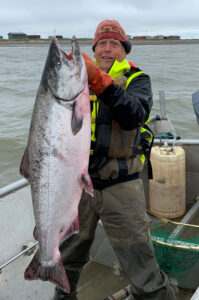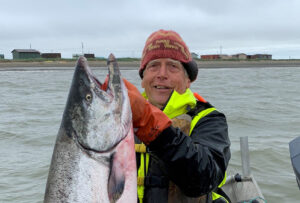
A teenage Gordon Terpening grew up watching ships navigating in and out of San Francisco Bay, and knew early on exactly what he wanted to do after high school.
“Once I heard about what a ship’s pilot did, I decided that’s what I wanted to do.”
After graduating from the California Maritime Academy with a Bachelor’s in Nautical Science, Terpening realized these ambitions and went to sea. His first job, towing lumber out of Coos Bay, Oregon, was just the beginning. He’s been involved in the maritime industry in one way or another ever since. Turns out he was one of the lucky humans who get to love their life’s work.
“I’m a sea going guy,” he says. The combination of peaceful and exciting fit him perfectly.
“Going to sea is basically hours and hours of boredom broken up by moments of sheer terror.”
Over the years, Terpening has piloted vessels around the U.S. and the world. It’s not just the locations that varied, it’s the type of work. He’s worked on a seagoing dredge doing underwater excavation, provided ocean transportation for the Navy as a civilian in the Military Sealift Command, on board tankers in the Far East, hauled jet fuel around the world, and supplied and towed oil rigs near Trinidad and Tobago.
“Generally, it was always so rough off the east coast of Trinidad,” Terpening says. “The trade winds are blowing from the east and the current from South America is flowing north, so you’re always in the trough.”
“This was before the Amoco Cadiz in France and before the Brayer in Shetland, and so the big spills were kind of yet to come.”
These experiences fine-tuned his skills at handling boats and trained him well for his years as a vessel pilot in Alaska.
Terpening says piloting in some other parts of the world, in and out of the same port day after day, can seem dull in comparison.
“When you’re a pilot in southwestern Alaska, all the ports are all different, and they all have their own problems,” he says. “And you get to see the wildest parts of Alaska. I loved it.”
Terpening describes how he analyzed the approach to each port, evaluating the forces such as wind, waves, and propulsion that are acting on the ship.
“It’s kind of like constantly drawing vector diagrams in your head,” he says. “That’s what I see when I’m docking a ship. It’s all just math.”
Terpening says he’s happy to be able to use these varied experiences to contribute to the work of the Council’s Port Operation and Vessel Traffic System Committee. He thinks that the Council’s independent oversight, as mandated by the U.S. Congress, makes a big difference.
“I try to tell other people about how amazing I think this committee is,” Terpening says. He pointed out a Council report on “messenger lines” as an example.
Passing a messenger line is the first step in setting up a tow line between a tug and a tanker in distress. The lighter weight messenger line helps responders connect the heavy tow lines. In 2020, the Council studied the best methods and tools for passing these lines between vessels. Little research had been done on the topic before.
“I mean that is amazing stuff that nobody would do unless you had the funding and the wherewithal of a committee like ours.”
Messenger line study: In 2020, the Council released a study evaluating methods of establishing tow lines between an escort tug and a tanker in distress. This study demonstrates the importance of the Council’s independent research. Learn more: VIDEO: Study of line-throwing technology demonstrates importance of the Council’s independent research
Gordon Terpening is a member of the Council’s Port Operations and Vessel Traffic Systems Committee. The committee monitors port and tanker operations in Prince William Sound.
